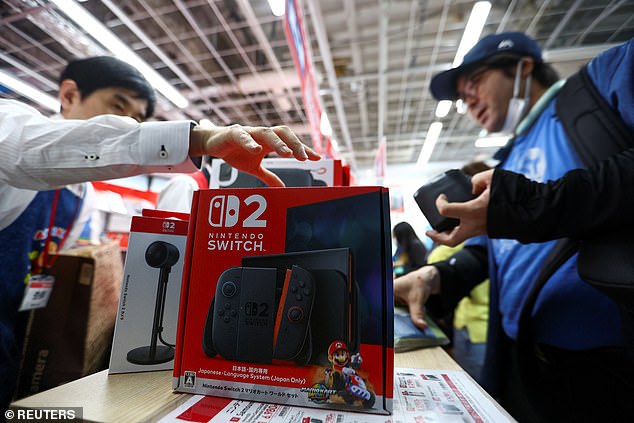[ad_1]
Gaming fans queued up outside tech stores worldwide on Thursday morning, in a bid to get their hands on the latest big launch in the gaming world.
The Nintendo Switch 2 is the successor to the original Switch – the third best selling games console in history, and its launch is the first of a major console since 2020.
Nintendo’s original Switch console has sold 152million units. The firm is no doubt hoping its new offering can surpass this original figure.
The gaming industry is bigger than ever before and is expected to reach $236.9billion in 2025, according to Midia Research. By 2031, the sector could be worth $280.1billion as gaming firms continue to grow.
Nintendo has seen its share price rise by 32 per cent in the past year. Over the past five years, the firm is up 151 per cent.
This growth is largely reflected across the board, according to figures from Etoro, with gaming stocks far outpacing the US’ S&P 500 index.

Gaming fans worldwide queued up to get their hand son the latest Nintendo Switch console
A gaming stocks basket compiled by Etoro show the eight leading gaming firms have grown at four times the rate of the S&P 500, up 46 per cent over the past year compared with 12 per cent for the index.
Over the past five years, these gaming stocks have risen 141 per cent, compared to 101 per cent for the S&P 500.
Over the same period, the FTSE 100 and Nasdaq increased by five per cent and 13 per cent respectively.
Lale Akoner, global market analyst at Etoro, said: ‘Gaming stocks’ outsized returns in 2025 aren’t just a function of cyclical tailwinds from blockbuster launches like GTA VI or the upcoming Switch 2.
‘What we’re witnessing is a structural revaluation of the sector. The shift to digital distribution and live‑service models has turned what used to be hit‑driven publishers into recurring‑revenue machines.’
Sam North, market analyst at Etoro, said an increase in recurring revenue models have helped to stabilise growth and is ‘enabling publishers to generate predictable cash flows while reducing dependence on hit releases.’
On top of this, he says, gaming continues to become more mainstream, ‘with smartphone penetration, 5G connectivity, and the rise of online gaming making games more accessible and social.’
| Brand | Returns 1 year | Returns 3 years | Returns 5 years |
|---|---|---|---|
| Nintendo | 32% | 97% | 151% |
| Sony | 42% | 59% | 171% |
| Capcom | 52% | 132% | 338% |
| Electronic Arts | 17% | 16% | 26% |
| Take-Two | 57% | 105% | 69% |
| Roblox | 151% | 158% | 17% |
| Ubisoft | -52% | -78% | -85% |
| Konami | 69% | 116% | 438% |
| Source: Etoro | |||
Etoro’s basket is made up of Nintendo, Sony, Capcom, Electronic Arts, Take-Two Interactive, Roblox, Ubisoft and Konami.
While Call of Duty maker Ubisoft has fallen some 85 per cent over the past five years, and 52 per cent in the past year, this downturn is massively outweighed by the gains seen by other firms.
Japanese firm Konami, which produces the Metal Gear titles alongside Pro Evolution Soccer, has surged some 438 per cent over the past five years, including growth of 69 per cent in the past year.
Meanwhile, fellow Japanese producer Capcom, know for Street Fighter and Resident Evil, has risen 338 per cent in the past five years and 52 per cent in the past 12 months.
North said: ‘The standout performers, such as Capcom and Konami, have surged by pairing monetisation maturity with strategic global expansion and operational discipline.
‘Capcom, for example, now derives 70 per cent of its revenue from legacy titles, a reflection of how back-catalogue monetization and digital distribution (78% digital share) have buffered the company from new-release volatility.
‘Unlike some US counterparts, these firms avoided over-hiring and aggressive cost expansion, instead optimizing for long-term, scalable growth that aligns with gaming’s shift toward predictable, tech-like revenue models.’
Playstation producer Sony has risen 171 per cent since 2020, while Roblox has grown 151 per cent over 12 months.
The latter has more than 85million daily active users, equivalent to Germany’s entire population playing the game each day.
Gaming firms are also increasingly expanding beyond just video games themselves, most recently with the Minecraft movie and the second season of HBO’s The Last of Us.
Akoner said: ‘These franchises are breaking out of the console box – from cinematic releases and mobile spin‑offs to entire theme‑park attractions – creating multiple monetisation lanes that cushion earnings volatility.
‘As a result, investors are beginning to view gaming less as a speculative bet on the next big hit and more as a durable, long‑term growth story.’
North added: ‘Japanese publishers in particular have paired this monetisation maturity with cost discipline and steady hiring, avoiding the over‑expansion that is now forcing many US peers to retrench.
DIY INVESTING PLATFORMS

AJ Bell

AJ Bell
Easy investing and ready-made portfolios

Hargreaves Lansdown

Hargreaves Lansdown
Free fund dealing and investment ideas

interactive investor

interactive investor
Flat-fee investing from £4.99 per month

InvestEngine

InvestEngine
Account and trading fee-free ETF investing
Trading 212
Trading 212
Free share dealing and no account fee
Affiliate links: If you take out a product This is Money may earn a commission. These deals are chosen by our editorial team, as we think they are worth highlighting. This does not affect our editorial independence.
[ad_2]
This article was originally published by a www.dailymail.co.uk . Read the Original article here. .

